Hard Boiling Eggs
A lot of requests for a tutorial on this. It makes sense given that most hard boiled eggs end up sticking to the insides of their shells, and/or with that blue/green film around the yolks which signifies over-cooking. The first problem is best solved by time. Sticky shells result when you boil very fresh eggs. Easy-peel eggs can be had by either aging the eggs in the fridge for 10 days or longer, or letting the eggs sit at room temperature for about 24 hours. The aging loosens the membrane that surrounds the white from the inside of the shell, and that does the trick. Note that before you hard boil your eggs they should be chilled again, at least for this method, which assumes cold eggs.
So then, how to hard boil eggs in such a way that you don’t overcook them? Why just like this. Begin by placing your cold eggs in a pot and covering them with cold tap water, about an inch over the tops of the eggs is fine. More won’t hurt anything. Place the pot on the stove over medium-high heat. A little vinegar will help congeal any egg white that leaks out through a crack. A few tablespoons of salt is said to loosen those membranes I mentioned, but I’ve only had so-so results from that method.
Note: always boil one more egg than you need so you can check for doneness. And enjoy a light snack, maybe with a short beer and a dab of mustard. Nice.
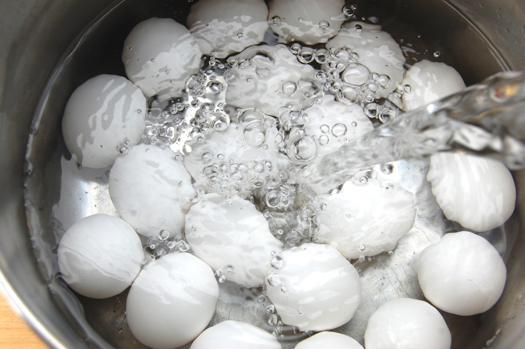
While the eggs are heating, prepare an ice water bath (this will stop the cooking when the eggs have reached perfect doneness.
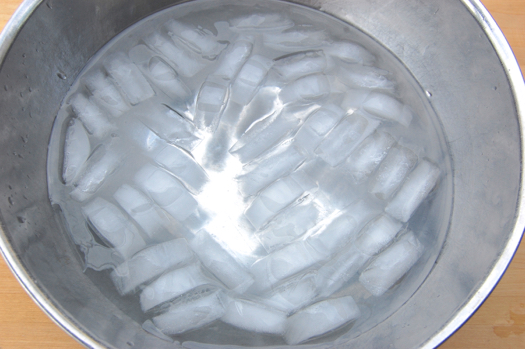
When the eggs reach the boil — but not a rolling boil — take them off the heat. Steam is terrible for photography. Sigh.
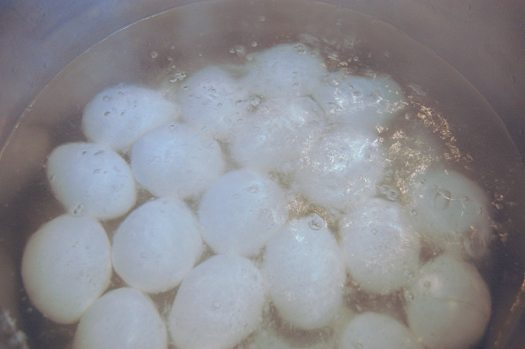
Let the eggs sit in the hot water for 10 minutes. At that point find your test egg, preferably the one with the crack in it. Lower it briefly into the ice bath, peel it and slice it in half. Perfecto.
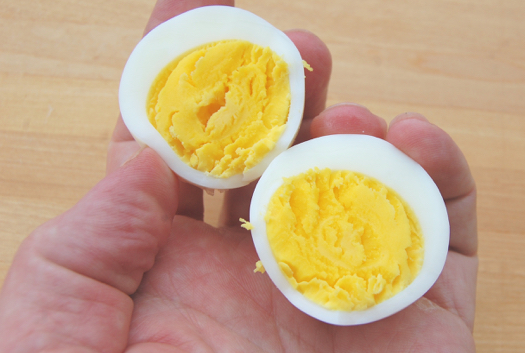
If your eggs still look a little creamy in the center, let the boiling go on for another two minutes. That should do the trick. At that point, gently immerse the cooked eggs into your ice water bath. Allow them to cool completely, 20-30 minutes.
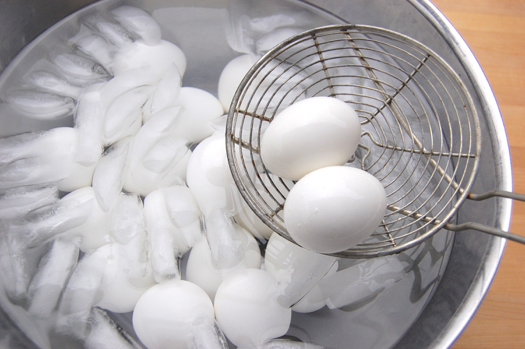
Remove the eggs from the bath and carefully place them on a rack to dry. Let them air dry for an hour or more. Carefully stack them in a bowl until they’re ready to be used. That’s it!
Hey Joe,
Your method is pretty much exactly the same one I used until Kenji Lopez-Alt at Serious Eats changed my mind. His steaming technique works *even better* at achieving perfectly consistent results. I haven’t had a single tough to peel egg since…even when they’re fresh! Also very easy to cook to one’s personal doneness preference; me, I like mine still a bit creamy in the center.
I still use old eggs most of the time, but since this is my very favorite snack (and a darned handy breakfast) every once in a while I just don’t want to wait. Steaming saves me the heartache of peeling-pocks.
Hey essbee!
I have heard of that technique but haven’t tried it. In truth my sous vide machine probably produces the best tasting hard boiled eggs I’ve ever had. But of course you need a lot of time for that (and of course most people don’t have them). Mrs. Pastry likes to tease me about it. “At last technology has evolved to the point we can hard boil eggs in only five hours!”
Anyway, thanks for the comment!
Cheers,
– Joe
Hi Joe, have you ever tried the pin method? You poke a hole on the narrow end of the egg with a pin/needle before boiling. I’ve had pretty good success with the membrane problem & the cracking problem.
I never have, but it sounds like fun!
Thanks Jey, I’ll try that one of these days!
Cheers,
– Joe
I steamed eggs for the first time today! 12 minutes in a basket over an inch of water. Worked like a treat and the shells just slipped off. There was a Seriouseats article about the science of it. Have you tried it vs. your technique?
I have not, Martina. Old habits die hard! I guess boiling is just what I do. Does the technique reduce cracking?
– Joe
It looks like essbee and I read the same nerdy (meant as a big compliment) food blogs!
I got one explosion and one hairline fracture out of a dozen eggs. I suspect that I was boiling the water a little too aggressively though.
Food-nerdy minds think alike, martina! I take it as the intended compliment. 🙂
I’ve been using the steam technique since May last year–which in my house means a LOT of trials…I’m spiritual twin to your little one, Joe–and I have yet to have any cracks or explosions. Sometimes I get a little variability in his fully cooked the eggs are, which seems to be based on a) how cold the eggs start and b) how high I keep the gas, but no major issues.
I particularly like that I can steam as few or as many as I want using this technique. I’ve done three in a small sauce pan and eight in a bigger one, and I have no doubt I could scale it further if I needed to do a dozen or more at a time.
My 10 yr old wanted to dye eggs today and I decided to try the baking method since i was feeling too distracted to remember to turn off the stove on time (and thought it better to not waste the water, seeing how we’re in the midst of an epic drought). Baking them worked great! I set them in a muffin tin and baked them for 30 minutes in a 325 oven. all the ones we’ve tried peeling so far have slipped right out and the yolks are perfect. It’s my new favorite method, even though it takes longer than boiling =).
Very interesting. Thanks, Robin!
– Joe
Interesting, the ice bath should be my new technique from now on with boiled eggs.
One question, have you ever done haminados (or chaminados)? I cook them twice a year for Passover and Jewish New Year. 4 hours in a big pan of barely boiling water on a bed of dried red onion skins. I wonder why they never have the black ring around the yolks, any idea?
Hey Clary!
Fascinating. I’ve never heard of that. But four hours you say…I honestly have no idea!
But I’ll ask some friends who might be in a position to know. Cheers,
– Joe
I could never imagine that there is special method an tutorial necessary for hard-boiling eggs 😀 For us, simple f0lks, it’s just placing an egg in water, boiling for some 10 minutes and then putting under tap with cold water. Dark film around yolk doesn’t bother me at all, because I prefer really hard eggs and better that than soft yolk. But i’ll have to try this method, these yolks look sooo yellow!
I was always taught that salt is what helps in case of leaks, but vinegar makes much more sense. I guess salt was something more at hand when you spot leaking, so it has been used in spite of not being very effective.
Hey Antuanete!
As my grandfather would have said: there’s a right way and a wrong way to do everything. 😉
I myself never thought about it much until I took a job in a restaurant making salads. If there was any grey around the yolk believe me I heard about it!
Cheers,
– Joe
I always boil eggs but I really don’t have the right way to boil them perfect. Sometimes they’re overcooked and sometimes they’re undercooked. So now, I want to try your method.